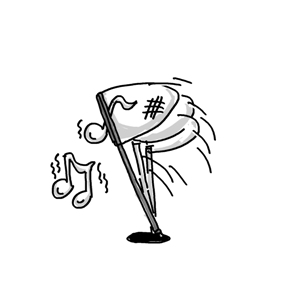Recordings can cultivate classical fans

Illustration: Lu Ting/GT
A bootleg recording of Hungarian-born pianist and conductor András Schiff's recital at Shanghai Concert Hall on June 14 sparked a media frenzy when it was shared online for free.
It was Schiff's first performance in the city after a year-long effort by Shanghai Concert Hall to court the international piano master.
Schiff's agent had turned down the venue's request to tape the concert, but an audience member sitting in the front row clandestinely recorded the entire recital, and posted it online for other music fans to enjoy gratis.
His generous act was welcomed by those who attended the recital as well as classical music fans who missed the show. But his illicit recording also drew condemnation from legal experts and performance industry professionals. Some netizens expressed concern that his behavior was disrespectful to the pianist.
Obviously, the unauthorized recording and distribution of an artist's work could be considered an infringement of copyright. But I think the consequences of having a live recording shared online for free are not necessarily bad for musicians.
Compared with fans of pop music, the audience for Western classical music is still a small one in China. To international virtuosos, China is a large potential market that remains untapped, and not just a hotbed of bootleggers.
At present, with the exception of some professional musicians and students, very few ordinary Chinese can really appreciate and enjoy the beauty and complexity of Western classical music. But I think interest in classical music can be nurtured and cultivated if Chinese audiences are given more opportunities to be exposed to it.
Last year, Shanghai hosted around 15,000 live performances, with classical music concerts making up just a small fraction of the total. Other major cities like New York and Tokyo, on the other hand, each hold around 30,000 to 40,000 performances annually. Chinese people who live outside of Beijing and Shanghai have even fewer chances to attend a concert.
If people are given so few opportunities to appreciate the beauty of classical music, how can they be expected to pay to listen to it? A free concert recording can be the first step in winning new fans, fans who will be willing to pay when they learn what's out there.
As for established music fans, they know that there is nothing like seeing a live concert.
Musicians are humans, not machines. Each time they perform, it will be different from the last. A musical recital can vary greatly because musicians are influenced by the reaction and feedback of a live audience. Sometimes, the audience reaction serves as inspiration to encourage musicians to perform more extraordinarily than ever.
Real music enthusiasts who understand musicians' moods and emotions and pay attention to details, such as the intensity, beat and rhythm, will not forgo the thrill of witnessing a live performance in favor of an unprofessional recording. This is the same reason why crowds of pop fans pack stadiums to see their favorite artists on stage.
The experience of enjoying a concert at a concert hall with excellent acoustics is very different from listening to a record at home.
A musician can attract a large audience not only because of his or her talent, but also because, as Oscar Wilde said, "A work of art is the unique result of a unique temperament." In most cases, a performer's magnetism cannot be felt unless you're sitting in the audience mere meters away.
China has long been notorious for pirated movies flogged on the street or available free online. But the wide choice of torrent and streaming sites does not stop Chinese moviegoers from going to the cinema.
China's box office revenue in 2012 was $2.7 billion, second only to the US. This represented a 28 percent surge from 2011 after Chinese and US officials agreed early last year to raise the number of Hollywood movies screened in China from 20 to 34 annually.
Although the box office takings from Chinese cinemas are just a fraction of US earnings, Hollywood producers know that the Chinese market is a future cash cow.
Similarly, international musicians should consider how a large untapped audience for classical music can be cultivated in China via the 'free samples' of bootleg recordings.